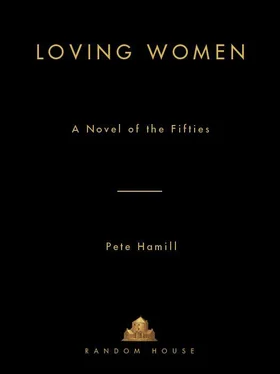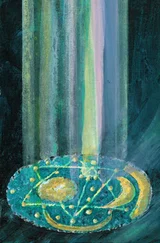“Just got it,” I said. “Right here in Sears.”
“And you got a bit more hair, too.”
I kept trying to sort out words in my head, to say things that were quick and witty and what was the word? Charming . And I wanted to do more than make brilliant remarks. For just a second, I wanted to reach over the counter and kiss her hard on the mouth and then lay her among the slips and panties. Just like that. Just do it. And be quick and witty and charming later.
“What can I do for you, child?” she said.
I turned my head. A few counters away, a heavy-set, balding white man was waiting on the Negro. I couldn’t tell this woman, this Eden Santana, that I’d gone on certain evenings to the highway near Ellyson Field hoping to see her pedal by. I couldn’t explain how hard I’d worked to erase her face from my mind. Child. She called me child .
“Well, I uh, well—” Get to it, just get to it . “I was wondering if you wanted to, well, go for a cup of coffee after work? You know, should auld acquaintance be forgot, and all that. Maybe we could even catch a movie at the Rex …”
And thought: Please don’t laugh .
Eden Santana looked at me and smiled in a warm sad way.
“Sure,” she said. “That’d be nice.”
When she walked out of Sears that evening, the church bells of the entire town were tolling seven and for a long moment I just stood there looking at her. All afternoon I had rehearsed words, actions, scenarios: if she said this, I would say that. I wanted to be with her immediately and wondered what she was doing at precisely this moment or that. But I also was riddled with fear and trembling; I wished for some great sudden disaster, an earthquake or a hurricane, anything that might postpone our appointment.
I had a paper sack in my hand, and inside were pencils, chalks and a sketchbook. I didn’t even remember buying them. The blur was total. But I sat down by the waterfront, made sketches of the blackened stumps of some piers that had burned the year before and threw them away. I counted seagulls. I wandered streets where old Victorian houses were sealed against the day, all of them large and grand and facing the sea. I said her name, over and over again: Eden Santana . Like decades of the Rosary. Eden Santana . Like music. It didn’t seem possible that she was there, in Pensacola, and that she had agreed to meet me after work; at the same time, she filled me with dread. Perhaps she would make fun of me, toy with me, stand me up as her friends watched.
And then, suddenly, she was there, in the fading gray Gulf light. She was smiling at me. And then beside me, holding the strap of her bag with both hands, seeming almost shy. I don’t know what I said to her, the first words, the initial greetings: Hello and how are you? I suppose. But I remember how she looked: about five six, with thin arms and a yellow blouse and legs hidden by slacks. I must have stammered out my name. She must have suggested The Greek’s. I remember looking at our reflections in a window, as we walked to Garden Street. I was taller than she was. She looked beautiful. As we crossed Garden Street, she took my arm. My muscles tensed.
Then we were holding menus and facing each other in a booth along the wall in a bright side room of The Greek’s. A dumpy waitress waited with her pencil poised. I said, You must be hungry, and Eden said, Damn sure. I read the menu from right to left, from prices to food, and decided on a hamburger. Eden said she’d have a bacon-and-tomato sandwich and a Coke, and the dumpy woman wrote down the order and went away. Eden Santana looked at me and smiled.
“Dutch treat, okay?” she said. “You can’t be makin’ all that much in the Navy.”
“No, no,” I said. “I got paid today. It’s on me.” I smiled. “I mean, I asked you .”
I glanced away from her, trying to look casual. The two Shore Patrol men sat together on stools at the counter. A guy in a Jax beer jacket was two stools away from them. Four teenagers on a double date were drinking ice-cream sodas in a booth. Apart from them, The Greek’s was empty.
“They’ll go broke in here if this is all they get for customers,” Eden said, looking around.
“Everybody’s probably waiting to get paid,” I said.
She fumbled in her purse, took out the Luckies. She pulled a match from one of those “Draw Me” packs of book matches. I took it from her, struck the match. She leaned in and sucked on the flame.
“I thought I’d never find you,” I said. Like that. Blurting out some of the words I’d rehearsed all afternoon.
She exhaled, then smiled. “You don’t even know me, child.”
“I know I saw you on that bus and I know you were beautiful and I know I wanted to see you again,” I said. “I know how bad I felt when I woke up and you were gone.”
I couldn’t look directly at her after saying the words, afraid she would laugh. She didn’t. “Had to get off,” she said in a flat voice. “I — well, I wasn’t feelin’ too good.” Then I looked up. Her color deepened and she opened her mouth as if to say something else, then bit her lower lip.
“You should’ve woke me up,” I said. “I’d’ve stayed with you. I’d’ve gotten off the bus if you needed me.”
She looked at me in an amazed way. “You know, I think you just might’ve done that.”
The food came and she asked me what base I was at and I told her and she said that she lived out past there a few miles, out past Ellyson Field, you know, over the bridge, by the bayou. She asked me why I joined the Navy and I said, Oh, you know, to see the world. So you could have a girl in every port? No, I really wanted to see what was out here. There’s people out here’d like to see what you saw every day. Brooklyn? Sure, New York, all those buildings, Broadway. She ate quickly, but in a dainty way, cutting up the sandwich with knife and fork and using the fork to pick up the sections. And she asked me questions: Where was I from and did I have a girl and how many were in my family and what did I do in the Navy and what did I want to do with my life. I’ve heard these same questions from many women since then, the diligent and wary assembling of a profile; but Eden Santana was the first to ask me such things. She said all this in her low voice with its hoarse burr, eating as I was talking, never speaking with food in her mouth. She kept her left hand in her lap.
And at her urging, I talked too. Didn’t talk, rolled , great tides of nouns and verbs flowing out of me, in combinations that surprised me, phrases I hadn’t rehearsed in my wandering afternoon. I tried to explain about Brooklyn, how I loved it and missed it and sometimes longed for it but hated it too, hated the stupidity of some of the people, the insistence on conformity, the worship of the ordinary, the surrender of themselves to the Church: telling the truth because if I tried to fake it, I’d never be able to remember the lies later. I told about Prospect Park and the Dodgers and my father (but left out my mother’s long and painful dying); asked her if she’d ever heard of Charlie Parker and when she hadn’t, I said I’d try to get her one of his records and then talked about Hank Williams as if I’d grown up listening to him. No, I told her, I didn’t have a girl. Well, I had one, I said, but that was before I went in the Navy, that was long ago, that was last summer, and besides, she’s gone. And then (quickly, smiling, tentative) said I wanted to be an artist. Really? Yeah, when I get out. Why wait? Well, I didn’t want to be an artist , I wanted to write and draw a comic strip, be a comic-strip artist, telling stories and drawing pictures; I wanted to live in Paris or Rome or somewhere like that, using all those foreign places as backgrounds to the story. Oh, like Terry and the Pirates ? Yeah, exactly. Maybe you can make me into the Dragon Lady. I was thinking exactly that. You’re lyin, now, child. Telling all this, I hoped she wouldn’t laugh.
Читать дальше












